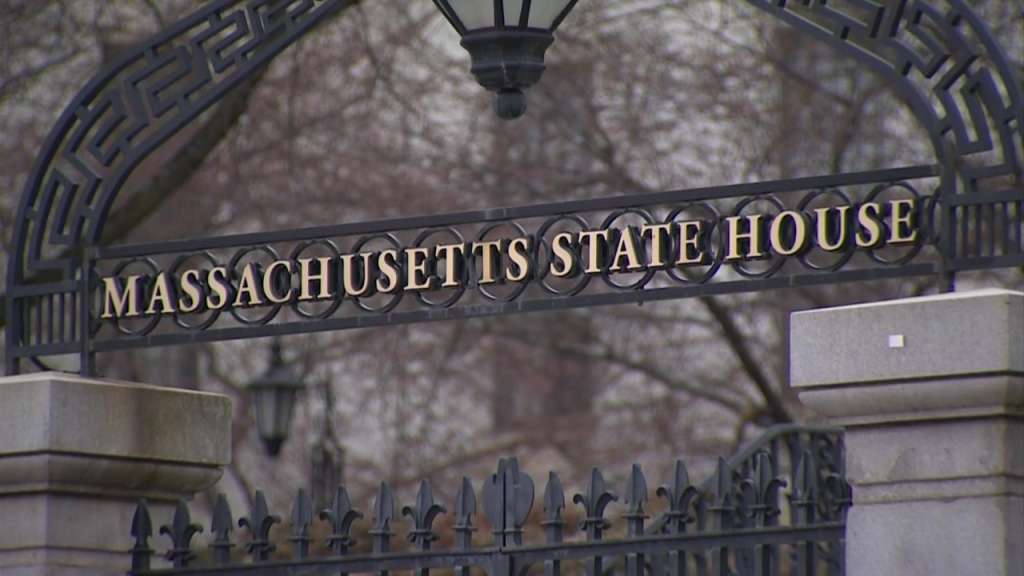As private disagreements between top House and Senate Democrats continue to hold up funding for the strained emergency shelter system and collectively-bargained pay raises for state workers, the Legislature gaveled into a four-day Thanksgiving weekend with no signs of an immediate deal.
“We’ll be working on it all weekend,” Senate Ways and Means Chairman Michael Rodrigues told the News Service after Wednesday’s sessions had adjourned. “There are no holidays with us,” he added.
Rodrigues and other top Democrats have been unable to agree on an annual bill that’s supposed to just wrap up fiscal loose ends for the previous fiscal year. Items not tethered to fiscal 2023, like requirements for the Healey administration’s handling of the migrant shelter crisis, and a proposed port zoning carveout for a soccer stadium on the Mystic River, are among the areas that are tripping up negotiators.
Rodrigues, the Senate’s lead negotiator on the bill, said the six-member conference committee appointed last week had “been in regular communications” and that the bill was held up by “normal disagreements.”
“We turned around a bill in six days that it took them six weeks to do, so that should show how serious we are to get this done,” the Westport Democrat said as he walked out of the chamber.
Gov. Maura Healey filed the closeout budget on Sept. 13. The House used that bill as its legislative vehicle to move a controversial package of gun law reforms in October before passing its version of the budget on Nov. 8. The Senate approved its redraft on Nov. 14.
After waiting so long to put bills up for votes, Democrats couldn’t find common ground before the Nov. 15 end of formal sessions for 2023 and have boxed themselves into a position of trying to get unanimous support on a compromise bill after Republicans in both branches voted against the two bills that are on the negotiating table.
Rodrigues would not say Wednesday whether the six-member committee had even met, and he refused to discuss specifics of the House-Senate disagreements. Under the Legislature’s operating rules (Joint Rule 1A), “[a]ll meetings” of conference committees “shall be open to the public” until the panel votes to go behind closed doors.
Meantime, the Senate budget chief said, he has been negotiating with fellow committee members. He talked with Republican Sen. Patrick O’Connor, another conferee, in the Senate Chamber before presiding over Wednesday’s session.
House Minority Leader Bradley Jones Jr. said he had “no idea” about the status of negotiations and was unsure whether the conference committee had met yet.
Asked about his expectations for next Monday, when the House holds its next session, Jones told the News Service: “Monday is like a lifetime away.”
“So right now, I would say, happy Thanksgiving everybody, try to enjoy the holiday and hopefully we will have an opportunity to have some progress made,” the North Reading Republican said Wednesday morning. “Ideally from the Republican perspective, the inability to achieve a resolution to this point would hopefully have the leadership say, well maybe there’s a couple of ideas on the Republican side that we didn’t incorporate that we could incorporate to make sure there’s no issues getting it to move forward.”
Jones was among the 26 lawmakers who signed a bipartisan letter Monday spearheaded by Sen. Walter Timilty calling on the conference committee to swiftly release portions of the supplemental budget that are supported by both the House and Senate. That includes funding for disaster relief, the collectively bargained raises for state workers, and programs tied to education, health care, environmental protection, and public safety.
The letter, which says legislative action on those matters is “critical,” was signed by 10 senators, nine of them Democrats; and 17 representatives including eight Democratic House members.
“Where there is mutual agreement, conferees can release items from the bills — in part, to fund essential services and virtual accounts, and we hope this can be done as soon as practicable,” they wrote. “We believe that these items are all essential to the well-being of our Commonwealth.”
Jones and Senate Minority Leader Bruce Tarr also wrote to state Comptroller William McNamara on Monday, asking the financial officer about “both the actual and potential implications any continued delays will have on the Commonwealth’s financial outlook and bond rating.”
The closeout budget must be finalized before McNamara’s office can complete a key annual filing, known as the Statutory Basis Financial Report (SBFR). Under state law, the comptroller must submit the SBFR by Oct. 31 — more than three weeks ago.
“Urgency” and “concerns” that McNamara voiced earlier this month “are graver now,” he wrote in his response to Jones and Tarr.
McNamara also offered a “personal” note on how the Legislature’s annual tardiness in closing the books impacts his own workflow, forecasting a potentially “untenable position” for himself in the future.
“Given my sincere respect for prerogatives of elected officials to consider and debate the complex matters of budgeting, I have not emphasized this individual concern in years when the SBFR was delivered within several days of the due date. However, in the present instance, even if there were favorable movement at this point, the total delay will now be several weeks. If the delay were to continue, so that I am at risk of being in violation of state law for more than two months and into the coming calendar year, I would view that as an untenable position,” the former Fidelity Investments executive wrote.
Healey opted to keep McNamara, a 2020 appointee of Gov. Charlie Baker, in his comptroller post earlier this year, and lauded his “professional, collaborative leadership to support our state’s financial health.”
(Copyright (c) 2023 State House News Service.
